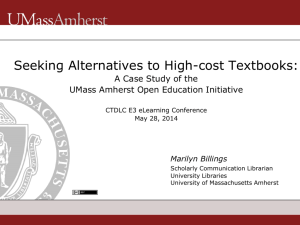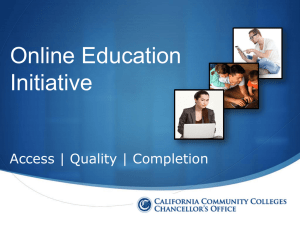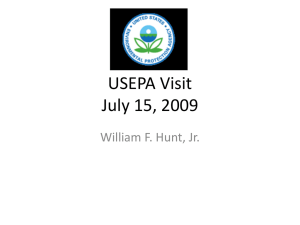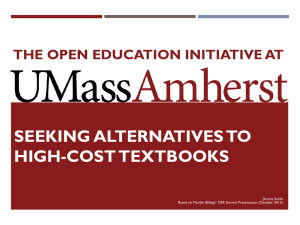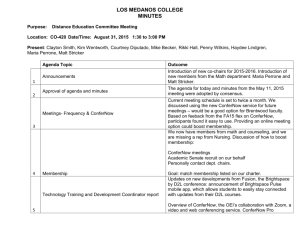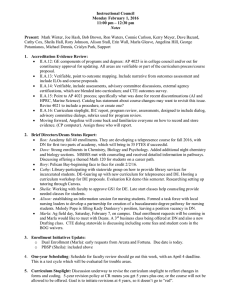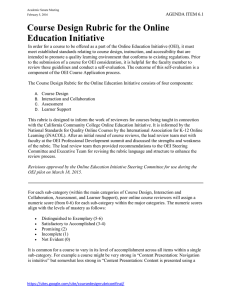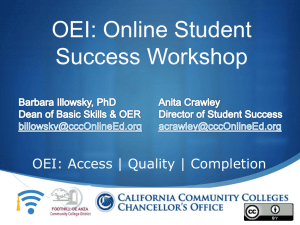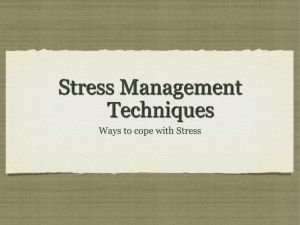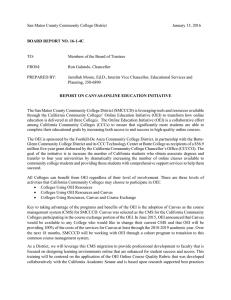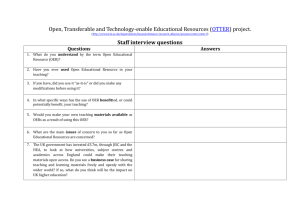UMass_OER_Fall2014 - ACRL New England Chapter
advertisement
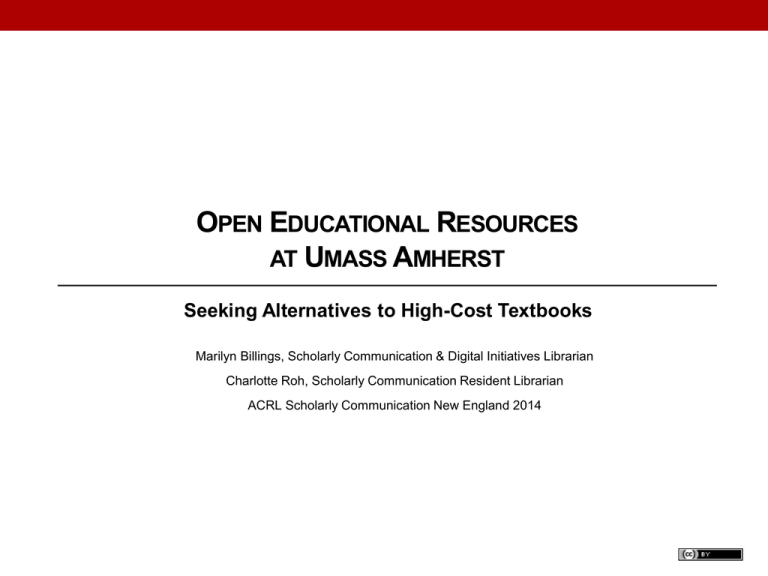
OPEN EDUCATIONAL RESOURCES AT UMASS AMHERST Seeking Alternatives to High-Cost Textbooks Marilyn Billings, Scholarly Communication & Digital Initiatives Librarian Charlotte Roh, Scholarly Communication Resident Librarian ACRL Scholarly Communication New England 2014 Why Open Education? “I stopped buying textbooks my second semester here.” - Marieme T., UMass Amherst Class of 2014 Seeking Solutions • The Provost’s Office and the University Libraries of the University of Massachusetts Amherst launched the Open Education Initiative (OEI) in the Spring of 2011. • The OEI is a faculty incentive program (a small grant) that encourages: – the creation of new teaching materials, – the use of library subscription materials, – or the use of existing open (free) information resources to support our students’ learning. OEI Workshops / Consultations • Workshops reviewing available OERs and librarylicensed resources • Individual consulting sessions for faculty with Scholarly Communication and subject liaison librarians, IT staff and others as needed • Topics covered: library databases, OER availability, copyright and licensing issues, accessibility concerns, creating a sustainable curriculum with OERs, managing resources in the LMS, assistance with creation of new content OEI Grant: Faculty Proposals • Basic course information – Number of students – Current textbook(s) and cost • Anticipated implementation date • Narrative (500 words) – Outcomes – Sustainability – Challenges – Assessment Photo credit: Derek Jensen aka FireChickenTA99 The current application form can be seen at http://goo.gl/forms/NRH9lQTF2L Success Stories Faculty School/College Course Proposed Savings Per Student Proposed Course Savings Actual Savings as of Spring 2014 Miliann Kang College of Humanities & Fine Arts Women's Studies 187: Gender, Sexuality and Culture $75 $22,500 $45,450 Charlie Schweik College of Natural Sciences Natural Resource Conservation 592: Introduction to Geographic Information Systems $50 $1,500 $12,400 Pam Trafford Isenberg School of Management School of Management 797: Financial Reporting for Decision Making $200 $8,000 $13,200 Patricia Bianconi College of Natural Sciences Chemistry 342: Inorganic Chemistry Laboratory $235 $10,575 $34,075 Daiheng Ni College of Engineering Civil & Environmental Engineering 520: Traffic Flow Theory $150 $3,150 $6,000 Nicholas Reich School of Public Health and Health Sciences Public Health 697: Introduction to Statistical Computing and Data Visualization $130 $3,900 $2,730 Barbara Roche College of Social and Behavioral Sciences Journalism 397E: Entrepreneurial Journalism $100 $1,500 $1,900 Patricia Gorman Honors College Honors 390W: Irish Writers and Cultural Contexts $65 $1,625 $2,145 Professor Hossein Pishro-Nik • Course: Electrical and Computer Engineering 314: Introduction to Probability and Random Processes • Cost of Regular Textbook: $143 • Proposed Cost Savings: $14,630 • Created: Introduction to Probability • Semesters Taught: 8 as of Spring 2014 • Total Enrollment: 468 • Total Savings: $43,329+ as it has been used in other courses as well Student Advocacy http://masspirgstudents.org/campaigns/ma/make-textbooks-affordable Partners Providing OEI Support Peer-Review by: CTFD IT Program faculty Librarians OIT Faculty Award Letter Liaison Assignment Consultation with partners prior to award Workshops • Copyright & licensing (Creative Commons) • Accessibility & sustainability Consulting • Liaison outreach to faculty • Finding resources • Creating new content Access to Resources • Liaisons, Circulation and E reserves for library materials • Licensing materials for class use Library at Work Partners • Center for Teaching & Faculty Development • OIT Academic Computing • Center for Educational Software Development Assessment Methods Objectives • Surveys • Was there a cost savings? • Qualitative interviews • Did students learn • Enrollment numbers effectively? • Did faculty implement the parameters of the grant? Results can be used for improvement and marketing. Lessons Learned: What Worked • Value of mini grants • Meet faculty where they are • Capitalize on your strengths • Articulate value of existing library services Copyright and Author Rights Two basic questions from faculty • How do I protect my copyright on the works I create? • How do I make sure I’m not infringing on the copyright of others? Answer: It depends. • How do you want your work to be used? What is it that you want out of this experience? • Do you want other educators to be able to use it? • Do you want to commercialize it? • Do you want attribution? Open Access and Fair Use • Check the CC license to see how the creator would like something to be used. • Exercise your fair use rights as academic educators and researchers. http://copyright.columbia.edu/copyright/files/2009/10/fairusechecklist.pdf Best Practices for Online Instruction • Mix and match content from multiple sources to best suit your • • • • • learning objectives For YouTube Videos use the Mashup tool Embed non-YouTube videos when possible For e-books with a detailed table of contents, provide web links to specific book sections Add short PDF documents as Files to open in the content frame Add long documents as Web Links and set to Open in New Window OER for Online instructors: Sample 1 OER for Online instructors: Sample 2 For YouTube Videos use the Mashup tool Connexions: http://cnx.org <Embed> non-YouTube videos Mix and match to meet teaching objectives Many eBooks have detailed Table of Contents Provide Web Link to specific book section Use institution databases when available Add short PDF’s as files Add long PDF’s as links
